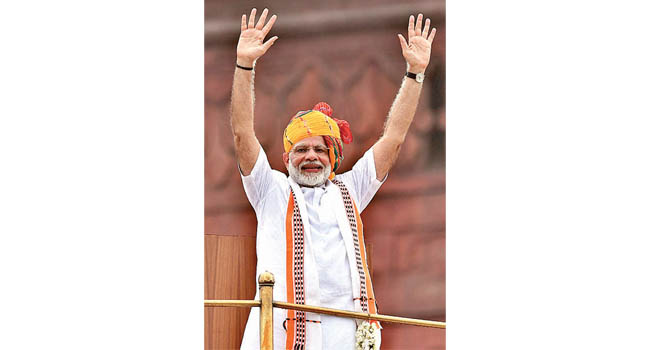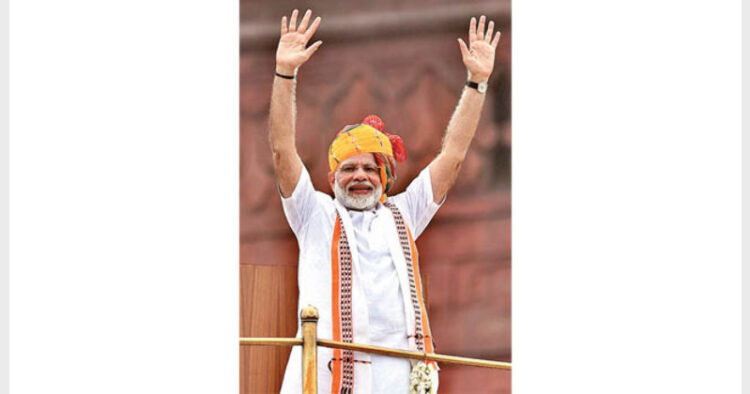
Prime Minister Narendra Modi addressing the nation
during Independence Day celebrations at the Red Fort in Delhi
during Independence Day celebrations at the Red Fort in Delhi
On the eve of India’s 73rd Independence Day, first speech of his second innings as PM, Modi unveils his exciting plans for a New Bharat
Sudhansu R Das
In his 92-minute address to the nation on occasion of the 73rd Independence Day, Prime Minister Narendra Modi offered clues to making India a US$5-trillion economy. A strong India can only safeguard its economic assets, its rich culture, human resources and natural capital. He urged people to correct the fundamentals for sustainable growth and prosperity.
His suggestion to integrate all three forces under one defence head will undoubtedly strengthen India’s defence preparedness. A strong defence system is the need of the hour since India has lost hundreds of elite defence personnel in terrorism-infested states. Over the decades, India has lost precious land in strategic border locations, innocent lives and property worth hundreds of crores of rupees. Prime Minister Modi’s foreign policy has changed the outlook of both the developed, and developing nations in our favour. His effort to show terrorism as the number one enemy against global trade, investment, peace and prosperity has motivated the world community to work together against the nations which use innocent youth for terror trade. Pakistan has got a stern warning from the world community to mend its policy of misusing human resources. India has to be strong in order to survive amid hostile neighbours.
The Prime Minister said the country would invest Rs 100 lakh crore on development of modern infrastructure. Research centres, schools, public libraries, playgrounds, lakes, roads, bridges, waterways, solar panels, designing centres, airports, market places, food processing units, handicraft and handloom development centres, cycle track, environment friendly projects and universities etc., will channel India’s youth energy into nation-building.
The Prime Minister said, “population explosion in the country will create various problems for the coming generations. Those who follow the policy of small family also contribute to the development of the nation, it is also a form of patriotism.” There is a need for the implementation of a well thought-out population policy to safeguard the demographic composition and the rich cultural diversity of the Indian states. Some Indian states are entering into a monoculture trap due to disproportionate population growth among a few communities due to religious bias and backwardness. No religion is above the interest of the nation. Population explosion can neutralise the growth benefit. It is the main cause of malnutrition among people, stunted growth among children, unemployment and unrest in the country. There is an urgent need for strict implementation of population policy before demographic change threatens the nation’s integrity the way it happened in USSR in the 80s.
“Time has come to think about how we can boost exports; each district of India has so much to offer,” said the Prime Minister. In fact, each district of India has immense potential to export one or two exclusive items. Kashmir can be the hub of spices, dry fruits and carpets. Over the years, the state has been losing its income due to middlemen and traders who don’t give the profit margin to the original Kashmiri producers. The natural environment in Kashmir has let grow a wide range of spices including the famous Saffron (kesar). The Madhubani painters of Bihar, the Paithani saree weavers of Maharashtra, the Sonepur saree weavers of Odisha, the Chikankari artisans of UP, the Patta Painters of Odisha and the weavers of Assam etc., add high value to their products with skill and imagination. There are hundreds of export items which can be produced at a very low cost.
Prime Minister Narendra Modi’s appeal to people for visiting at least 15 tourist destinations across India before 2022, shows his vision to tap India’s tourism potential. The most vibrant pilgrim spot in India – the Ram Setu can churn out crores of rupees. Millions of people in India and the Asian countries wait for the opportunity to touch the Ram Setu as they believe Lord Ram had walked over the bridge to defeat Ravana. It would give India the biggest tourism boom. An effort to recreate the natural beauty of the places associated with Lord Ram’s epic journey will undoubtedly boost India’s pilgrim sector.
The Prime Minister has advised converting the water conservation program of the government as a people’s movement. It is believed India had 11000 rivers and rivulets which can be revived to its full glory with people’s participation. The rivers of India had once contributed to the growth of the world’s richest civilisation and the most powerful economy. The rivers are still there awaiting people’s sympathy, respect and devotion. The revival of rivers, lakes and ponds will contribute to India’s becoming the richest country of the world again. In the past, our sages told the common man to worship rivers as goddesses. As a result, the rivers were flowing with full glory. This is high time for people to protect the rivers for its immense economic benefits. Rivers boost agriculture, pilgrim tourism, water transport, environment, rainfall, groundwater and soil nutrient. Indian rivers sustain the livelihood of millions of fishermen and meet the nutrition need of people.
Prime Minister in his speech has also made an appeal for abandoning single-use plastic. He said “can we free India from single-use plastic? The time for implementing such an idea has come and teams will be mobilised to work in this direction. Let a significant step be made on 2nd October.” India is a treasure trove of a large number of biodegradable material which can easily replace plastic bags. Production of jute, coir, cloth and paper bags will not only replace plastic bags but will create huge employment across the country. The malls in India should stop selling plastic bags to customers. Instead, they should sell jute, cloth, coir and paper bags. The global demand for bio-degradable utility items is growing at a faster rate. Australia imports tons of bamboo from Assam to make various utility items. India can export value-added products instead of raw material at a throwaway price. With the
available potential, India can regain its lost glory.
(The writer is Hyderabad-based journalist)














Comments